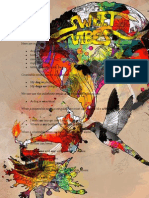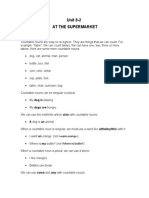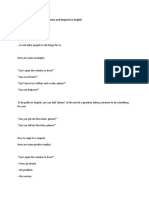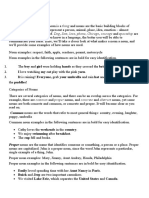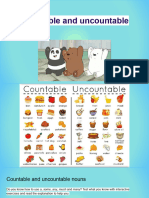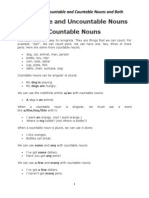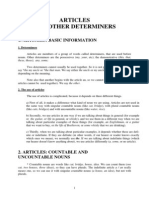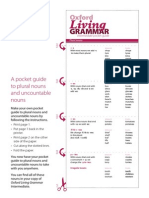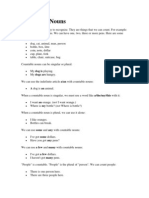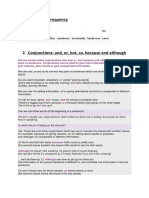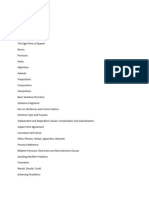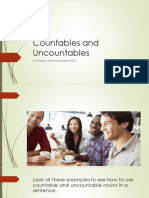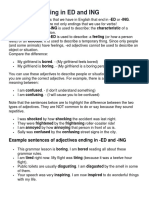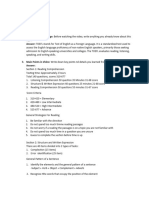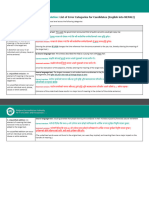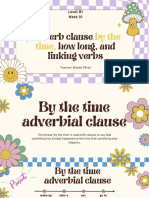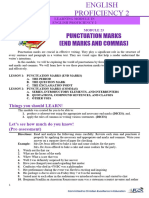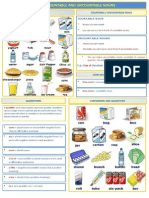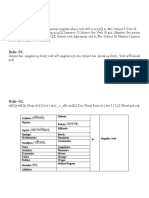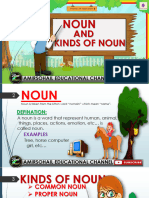The Noun and The Adjective
The Noun and The Adjective
Uploaded by
Toma MaricicaCopyright:
Available Formats
The Noun and The Adjective
The Noun and The Adjective
Uploaded by
Toma MaricicaOriginal Description:
Original Title
Copyright
Available Formats
Share this document
Did you find this document useful?
Is this content inappropriate?
Copyright:
Available Formats
The Noun and The Adjective
The Noun and The Adjective
Uploaded by
Toma MaricicaCopyright:
Available Formats
Countable and Uncountable Nouns A countable noun (e.g. ship) can be singular or plural. We can count ships.
We can say a ship / one ship or two ships. Here are some examples of countable nouns: We could see a ship in the distance. Claire has only got one sister. Ive got a problem with the car. Im going out for five minutes. An uncountable noun (e.g. water) is neither singular nor plural. We cannot count water. We can say water or some water but not a water and two waters. Here are some examples of uncountable nouns: Can I have some water? Shall we sit on the grass? The money is quite safe. I love music. Would you like some butter? Nouns after the, an / a and numbers There are some words that go with both countable and uncountable nouns. One of these is THE. We can say the ship (singular), the ships (plural) or the water (uncountable). But other words go with one kind of noun but not with the other. A/ an or one goes with the singular: I need a spoon. We do not use a / an with an uncountable noun. NOT a water, NOT a music. Nouns after some, many, much Some and many go with plural or uncountable nouns. We can also use plural and uncountable nouns on their own, without some or any. PLURAL Tom told some jokes Do you know any jokes? Tom usually tells jokes UNCOUNTABLE We had some fun. That wont be any fun. We always have fun.
Many and few go only with plural nouns. There werent many bottles. I made a few sandwiches. Much and a little go with uncountable nouns. I dont drink much wine. There was only a little bread left. Milk, soup are uncountable nouns. We cannot use a number in front of them. We do not usually say a milk or two soups. But we can say a carton of milk or two tins of soup. Here are some more examples: A carton of orange juice A tin of paint A bottle of water A jar of jam Measurements A kilo of cheese. Five meters of cable. Piece, slice etc A piece of wood A piece / slice of bread A piece / sheet of paper A bar of chocolate A loaf of bread Advice, information and news are uncountable nouns. We cannot use them with a / an or in the plural. Can you give me some advice? We got some information for the tourists. The following nouns are uncountable in English, although they may be countable in other languages: accommodation, baggage, behaviour, equipment, fun, furniture, homework, housework, litter, luck, luggage, progress, rubbish.. Singular or plural? Some nouns have only a plural form (with s) and take a plural verb. The clothes were in the dryer. The goods have been sent to you. Plural nouns Arms (weapons), belongings (things that belong to you), clothes, congratulations, customs, earnings, thanks, remains, troops
Some nouns have both a singular and a plural form with a difference in meaning. Singular Our special price is $20 cheaper than normal. So dont miss this saving. My savings are in the bank. Some nouns have a plural form (with s) but take a singular verb. The news was worse than I expected. Other examples: economics, maths, physics, politics. Pair nouns We use a pair noun for a thing made of two parts which are the same. Some pair nouns are binoculars, glasses, jeans, pants, pyjamas, scissors, shorts, tights, trousers. A pair noun is plural and takes a plural verb. My jeans need washing. We cannot use a / an or a number with a pair noun. But we can use a pair of. I need some jeans or I need a pair of jeans. Police, people and cattle These nouns have a plural meaning and take a plural verb. The police have warned motorists to take extra care. People dont know what the future will bring. The cattle are going to be sold with the farm. Compound nouns Form Compound nouns are very common in English. We make a compound noun by putting two or more separate nouns together to make a new noun. football boots a telephone box a car seat a computer software shop In a compound noun there is a headword and one or more words that define the headword. The headword always goes at the end. football boots These are boots. What kind of boots? Boots for playing football. a computer software shop This is a shop. What kind of shop? A shop that sells software. What kind of software? Software for computers.
A defining noun in a compound noun is normally singular. A shop that sells records is a record shop. A shop that sells books is a bookshop. Note: However, we say clothes shop and sports shop. A compound noun sometimes has a different meaning from a noun phrase with of. Compare these sentences. How many bottles of wine do we need for the party? (How much wine?) They threw the wine bottles away. (Empty bottles.) He bought three packets of cigarettes. (New packets.) The floor was covered with cigarette packets. (Empty packets.) Some compound nouns are written as one word. Others are written as two words, or are hyphenated. Unfortunately there are no rules. a teacup, a bathroom a coffee cup, a tennis racket a living-room, stomach ache Comparatives and superlatives Form one syllable tall taller the tallest cold colder the coldest one syllable: short vowel + one consonant hot hotter the hottest thin thinner the thinnest big bigger the biggest two syllables: consonant + y heavy heavier the heaviest pretty prettier the prettiest two or more syllables modern more modern the most modern interesting more interesting the most interesting irregular good better the best bad worse the worst far further the furthest A comparative adjective is often followed by than. Russia is bigger than Canada. The film was much better than I expected. as ... as ... can be used to make comparisons. Her house is as big as mine. Silver isn't as expensive as gold. In the negative so ... as ... is also possible. Silver isn't so expensive as gold.
Comparatives and superlatives Look at these sentences. In each pair one is right and one is wrong. 1. 2. 3. 4. Use The comparative is used to compare two separate items or groups. Alex 1.92m Alex's brothers 1.85m 1.83m 1.75m Alex is taller than his brothers. The superlative is used to compare one member of a group with the rest of the group. all the mountains in the world Mount Everest Mount Everest is the highest mountain in the world. The elephant is the heaviest land animal in the world. The elephant is the most heavy land animal in the world. He's as tall as his brother. He's so tall as his brother. The film was better than the book. The film was better that the book. My exam results were worse than Andy's. My exam results were more bad than Andy's.
You might also like
- GMAT® Official Guide Supplement: Sentence Correction BasicsFrom EverandGMAT® Official Guide Supplement: Sentence Correction BasicsRating: 4.5 out of 5 stars4.5/5 (5)
- Rainbow Writing Book v2Document42 pagesRainbow Writing Book v2Kalpana GovindanNo ratings yet
- Partizip II 100 Common VerbsDocument7 pagesPartizip II 100 Common VerbsEdna Odette Melo UscangaNo ratings yet
- Countable and Uncountable Nouns Revision + ExerciseDocument14 pagesCountable and Uncountable Nouns Revision + ExerciseMarko TasicNo ratings yet
- Countable and Uncountable Nouns - The Complete Guide (2021)Document12 pagesCountable and Uncountable Nouns - The Complete Guide (2021)Hayder AliNo ratings yet
- Countable and Uncountable NounsDocument18 pagesCountable and Uncountable NounsMX CreationNo ratings yet
- Apuntes Temas A VerDocument8 pagesApuntes Temas A VerHebe GómezNo ratings yet
- Resumen Ultimos Temas Ingles 5Document53 pagesResumen Ultimos Temas Ingles 5mirnasaNo ratings yet
- A What Is The DifferenceDocument7 pagesA What Is The DifferenceAngemsaNo ratings yet
- Countable and Uncountable NounsDocument4 pagesCountable and Uncountable NounsIva Waya VasiljevNo ratings yet
- Referencia Gramatical PEARSONDocument147 pagesReferencia Gramatical PEARSONGuille AlvarengaNo ratings yet
- Tugas ViaDocument4 pagesTugas ViaVeronicaVidyaNo ratings yet
- Curso de Ingles UMG 2021Document127 pagesCurso de Ingles UMG 2021KARLA ELIZABETH CASTAÑEDA BATRESNo ratings yet
- Uncountable Nouns: This News Is Very ImportantDocument51 pagesUncountable Nouns: This News Is Very ImportantRudi SusantoNo ratings yet
- Count and No Count NounsDocument8 pagesCount and No Count NounsOlga BarraganNo ratings yet
- Countable UncountableDocument4 pagesCountable Uncountableelenaflorin100% (1)
- Adjectives 22Document18 pagesAdjectives 22oussamaNo ratings yet
- Countable Nouns: A Dog Is An AnimalDocument4 pagesCountable Nouns: A Dog Is An AnimalAndrea RodriguezNo ratings yet
- Ordinal NumbersDocument6 pagesOrdinal Numberssimao5No ratings yet
- Common NounsDocument7 pagesCommon NounsHunny WyattNo ratings yet
- Ingles Unidad 2Document20 pagesIngles Unidad 2Deiissy ChagalaNo ratings yet
- At The SupermarketDocument6 pagesAt The SupermarketHarold Joe WirthNo ratings yet
- English 3-5Document112 pagesEnglish 3-5Kristal GarciaNo ratings yet
- GrammarDocument49 pagesGrammarIka SetyawatiNo ratings yet
- Nouns & Pronouns: NotesDocument32 pagesNouns & Pronouns: NotesDevendar SandhuNo ratings yet
- Back To Basics 1-2 The Noun: Why Is English So Hard?Document5 pagesBack To Basics 1-2 The Noun: Why Is English So Hard?Cass PalmaNo ratings yet
- Countable Nouns: A Dog Is An AnimalDocument3 pagesCountable Nouns: A Dog Is An AnimalsrinivasanaNo ratings yet
- Learn To Use "Can" For Permission and Requests in EnglishDocument24 pagesLearn To Use "Can" For Permission and Requests in EnglishthugnatureNo ratings yet
- Прво има еден дел во црвено кој не e потребен само тука е за секој случај ако нешто плус и текне да прашува, иначе само тоа во црно е потребно. ArticlesDocument11 pagesПрво има еден дел во црвено кој не e потребен само тука е за секој случај ако нешто плус и текне да прашува, иначе само тоа во црно е потребно. ArticlesGalaNo ratings yet
- AdjectivesDocument19 pagesAdjectivesapi-242894068100% (5)
- Ammar - Workbook.for - Adults..A.Self-Study - Guide.to - Improve.Functional - Writing IELTSMatters - Com PreviewDocument9 pagesAmmar - Workbook.for - Adults..A.Self-Study - Guide.to - Improve.Functional - Writing IELTSMatters - Com Previewtokox17639No ratings yet
- The Noun TheoryDocument13 pagesThe Noun Theorydianacorb00No ratings yet
- 7 English Grammer Crux PDFDocument25 pages7 English Grammer Crux PDFbilalturiNo ratings yet
- 1.4 Adjectives: NounsDocument16 pages1.4 Adjectives: NounsLilibeth MalayaoNo ratings yet
- Nouns: Common Nouns Are The Words That Refer To Most General Things: Country, Evening, LaughterDocument5 pagesNouns: Common Nouns Are The Words That Refer To Most General Things: Country, Evening, LaughterAnna DubetsNo ratings yet
- 8+9. The Article With Countable+Uncountable NounsDocument12 pages8+9. The Article With Countable+Uncountable NounsD1chuNo ratings yet
- Countable and UncountableDocument13 pagesCountable and Uncountableyoscarlyvargas19No ratings yet
- MateriDocument31 pagesMateriRudi SusantoNo ratings yet
- Countable and Uncountable NounsDocument4 pagesCountable and Uncountable NounsHéctor Reynaldo Acosta Espinal50% (2)
- Countable and Uncountable Nouns: Made By: Fadhil (Chong Wey) Ua Adam (Handsome) PHD Amir (Robin Hood) ErDocument8 pagesCountable and Uncountable Nouns: Made By: Fadhil (Chong Wey) Ua Adam (Handsome) PHD Amir (Robin Hood) ErMuhammad Izzat SyahmiNo ratings yet
- Articles and Other DeterminersDocument17 pagesArticles and Other DeterminersPIRULETANo ratings yet
- Olg Int Dwnlds PNDocument2 pagesOlg Int Dwnlds PNARANo ratings yet
- NounsDocument4 pagesNounsValentine N100% (1)
- Countable NounsDocument3 pagesCountable NounsRuben BatistaNo ratings yet
- A Colection of TOEFL Reading Comprehension 4Document3 pagesA Colection of TOEFL Reading Comprehension 4Cynthia_ssiNo ratings yet
- Sheet 1Document24 pagesSheet 1rimonNo ratings yet
- NounDocument56 pagesNounAna Karem Kashmir Delgado100% (3)
- Legal EnglishDocument13 pagesLegal EnglishRocheNo ratings yet
- ArticlesDocument9 pagesArticlesAditi PaulNo ratings yet
- Cours Grammaire Anglaise L2 S2... 2023-2Document12 pagesCours Grammaire Anglaise L2 S2... 2023-2ndiayekamsa58No ratings yet
- Countable & Uncountable NounsDocument5 pagesCountable & Uncountable NounsRacheal John Story100% (1)
- Asdasf Saeef S FG FsDocument8 pagesAsdasf Saeef S FG Fszurab.avaliani.1No ratings yet
- Countables and Uncountables PDFDocument26 pagesCountables and Uncountables PDFBenji Mallma GabinoNo ratings yet
- صيدلية الرايتينجDocument30 pagesصيدلية الرايتينجnerramagdyyNo ratings yet
- Intermediate English GrammarDocument94 pagesIntermediate English GrammarrudbethNo ratings yet
- 2023-2024 - Grade 5 1 - English Quiz 1-2 - HELPFUL TIPSDocument4 pages2023-2024 - Grade 5 1 - English Quiz 1-2 - HELPFUL TIPSdaliclar466No ratings yet
- Expression of QuantityDocument8 pagesExpression of QuantityGIYAN DWINo ratings yet
- The Comparative and The SuperlativeDocument8 pagesThe Comparative and The SuperlativeWendyNo ratings yet
- Countable and Uncountable NounsDocument9 pagesCountable and Uncountable NounsNathaliaSantillandelRosillo100% (1)
- Countable Uncountable Nouns Konu Anlatimi Slayt 93946Document30 pagesCountable Uncountable Nouns Konu Anlatimi Slayt 93946Ramazan ÜlgerNo ratings yet
- No Mistakes Grammar Bites, Volume XXVII, “Subject and Verb Agreement” and “Capitalization Rules”From EverandNo Mistakes Grammar Bites, Volume XXVII, “Subject and Verb Agreement” and “Capitalization Rules”No ratings yet
- Conjunctions: What Is A Conjunction?Document5 pagesConjunctions: What Is A Conjunction?uswatun khoiriyahNo ratings yet
- Toefl Basing KayesDocument3 pagesToefl Basing KayeskarismaanrNo ratings yet
- English Assignment 1Document22 pagesEnglish Assignment 1katilabbuNo ratings yet
- Verb To Be: Why Is It Essential To Learn The Verb To Be? and What Is?Document1 pageVerb To Be: Why Is It Essential To Learn The Verb To Be? and What Is?Sharemmy PMNo ratings yet
- Buku Bahasa Inggris 1a Sma Ma Kelas X BAB 1 S.D 5Document6 pagesBuku Bahasa Inggris 1a Sma Ma Kelas X BAB 1 S.D 5Nani HerlinaNo ratings yet
- Week 9 Module 7 Koko, Soko, Asoko Using Wa ParticleDocument12 pagesWeek 9 Module 7 Koko, Soko, Asoko Using Wa ParticleAngela DrianaNo ratings yet
- GermanDocument120 pagesGermanSe RinNo ratings yet
- GeroundsDocument8 pagesGeroundsDENNIS HERRERANo ratings yet
- Worksheet 2 - Linguistics Eng B: MorphologyDocument2 pagesWorksheet 2 - Linguistics Eng B: MorphologyNajam Khan MahsudNo ratings yet
- Adverbs: Definition of An AdverbDocument5 pagesAdverbs: Definition of An AdverbEspinosa Alfaro María FernandaNo ratings yet
- Derivatives 2Document6 pagesDerivatives 2Rahayu DewiNo ratings yet
- Nepali List of Error CategoriesDocument6 pagesNepali List of Error Categorieswenoki6410No ratings yet
- B1 Week 10 by The Time, Linking VerbsDocument48 pagesB1 Week 10 by The Time, Linking Verbswendypo97No ratings yet
- Action Verbs and Objects-PracticesDocument8 pagesAction Verbs and Objects-PracticesMona KabsNo ratings yet
- Grammatica SvedeseDocument40 pagesGrammatica SvedeseTiziano LicataNo ratings yet
- Detailed Lesson PlanDocument7 pagesDetailed Lesson PlanNalla Jane Villaflor100% (1)
- WH QuestionsDocument9 pagesWH QuestionsRiyan IlhamdiNo ratings yet
- English Proficiency 2 G11 Module 23 2nd Period For PrintingDocument8 pagesEnglish Proficiency 2 G11 Module 23 2nd Period For PrintingdomafecaluyoNo ratings yet
- SIMULADO DE INGLÊS 2º AnoDocument2 pagesSIMULADO DE INGLÊS 2º Anocidia penaNo ratings yet
- Food Countable and Uncountable Nouns QuantifiersDocument3 pagesFood Countable and Uncountable Nouns Quantifiersapi-169100738100% (2)
- Articles in GrammarDocument13 pagesArticles in GrammarAdelina Elena GhiuţăNo ratings yet
- Partizipien Als Adjektiv Theory PDFDocument5 pagesPartizipien Als Adjektiv Theory PDFjashu negiNo ratings yet
- Subject Verb Agreement FINALDocument12 pagesSubject Verb Agreement FINALBiplob ShathiNo ratings yet
- seminar 8 модальність реченняDocument20 pagesseminar 8 модальність реченняАнна ГорбуноваNo ratings yet
- Def.-An Adverb Is A Word Which Modifies The Meaning of A Verb, An Adjective or Another AdverbDocument15 pagesDef.-An Adverb Is A Word Which Modifies The Meaning of A Verb, An Adjective or Another AdverbAbdul wahab khanNo ratings yet
- English Grammar (Noun) by AmirsohailDocument16 pagesEnglish Grammar (Noun) by AmirsohailAmir SohailNo ratings yet
- Present TenseDocument6 pagesPresent Tenseapi-326210415No ratings yet
- Use of English Part 1 (U1,5,9) - Improve Your Skills - 2Document6 pagesUse of English Part 1 (U1,5,9) - Improve Your Skills - 2laia.lopez.bofillNo ratings yet

















